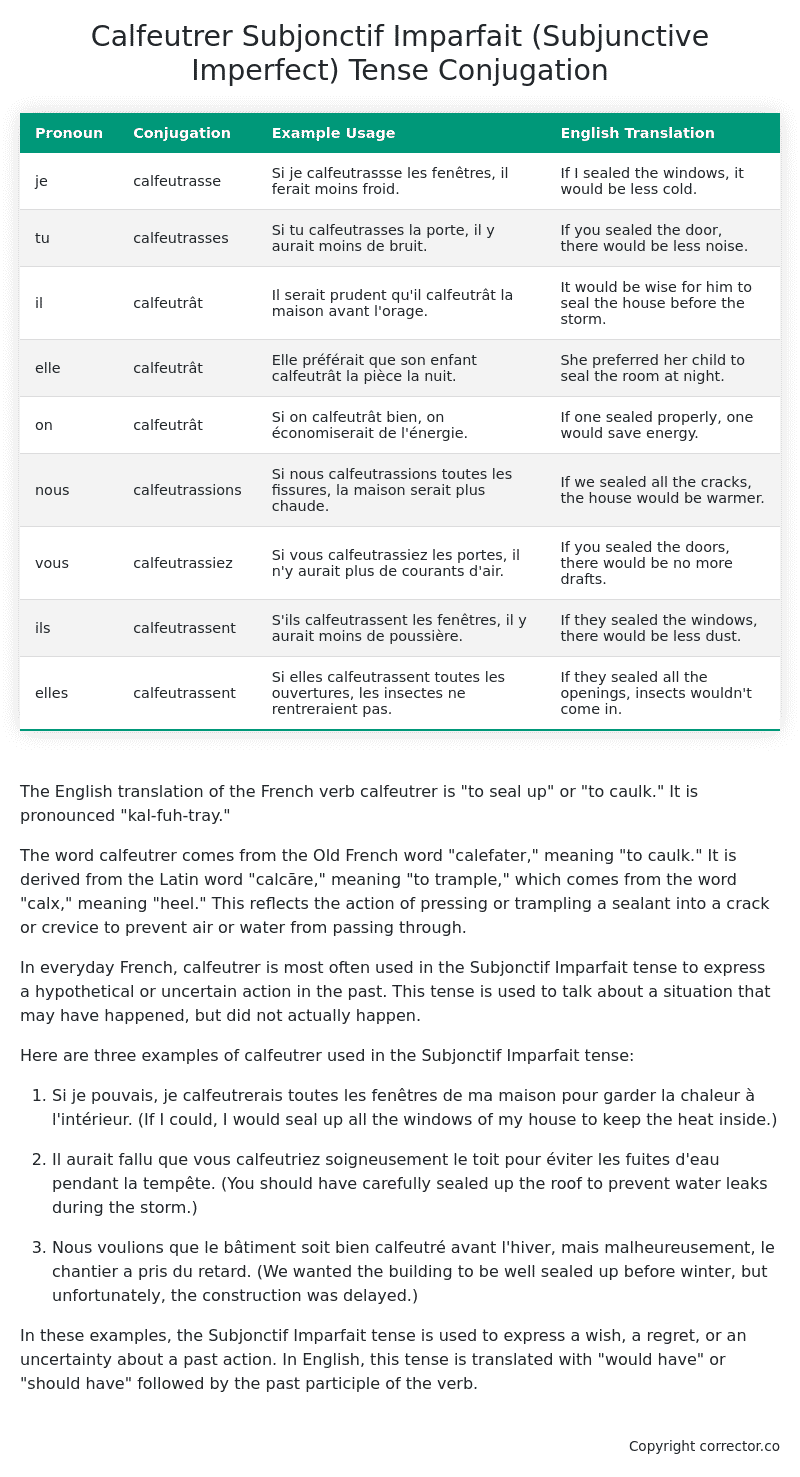Subjonctif Imparfait (Subjunctive Imperfect) Tense Conjugation of the French Verb calfeutrer
Introduction to the verb calfeutrer
The English translation of the French verb calfeutrer is “to seal up” or “to caulk.” It is pronounced “kal-fuh-tray.”
The word calfeutrer comes from the Old French word “calefater,” meaning “to caulk.” It is derived from the Latin word “calcāre,” meaning “to trample,” which comes from the word “calx,” meaning “heel.” This reflects the action of pressing or trampling a sealant into a crack or crevice to prevent air or water from passing through.
In everyday French, calfeutrer is most often used in the Subjonctif Imparfait tense to express a hypothetical or uncertain action in the past. This tense is used to talk about a situation that may have happened, but did not actually happen.
Here are three examples of calfeutrer used in the Subjonctif Imparfait tense:
-
Si je pouvais, je calfeutrerais toutes les fenêtres de ma maison pour garder la chaleur à l’intérieur. (If I could, I would seal up all the windows of my house to keep the heat inside.)
-
Il aurait fallu que vous calfeutriez soigneusement le toit pour éviter les fuites d’eau pendant la tempête. (You should have carefully sealed up the roof to prevent water leaks during the storm.)
-
Nous voulions que le bâtiment soit bien calfeutré avant l’hiver, mais malheureusement, le chantier a pris du retard. (We wanted the building to be well sealed up before winter, but unfortunately, the construction was delayed.)
In these examples, the Subjonctif Imparfait tense is used to express a wish, a regret, or an uncertainty about a past action. In English, this tense is translated with “would have” or “should have” followed by the past participle of the verb.
Table of the Subjonctif Imparfait (Subjunctive Imperfect) Tense Conjugation of calfeutrer
| Pronoun | Conjugation | Example Usage | English Translation |
|---|---|---|---|
| je | calfeutrasse | Si je calfeutrassse les fenêtres, il ferait moins froid. | If I sealed the windows, it would be less cold. |
| tu | calfeutrasses | Si tu calfeutrasses la porte, il y aurait moins de bruit. | If you sealed the door, there would be less noise. |
| il | calfeutrât | Il serait prudent qu’il calfeutrât la maison avant l’orage. | It would be wise for him to seal the house before the storm. |
| elle | calfeutrât | Elle préférait que son enfant calfeutrât la pièce la nuit. | She preferred her child to seal the room at night. |
| on | calfeutrât | Si on calfeutrât bien, on économiserait de l’énergie. | If one sealed properly, one would save energy. |
| nous | calfeutrassions | Si nous calfeutrassions toutes les fissures, la maison serait plus chaude. | If we sealed all the cracks, the house would be warmer. |
| vous | calfeutrassiez | Si vous calfeutrassiez les portes, il n’y aurait plus de courants d’air. | If you sealed the doors, there would be no more drafts. |
| ils | calfeutrassent | S’ils calfeutrassent les fenêtres, il y aurait moins de poussière. | If they sealed the windows, there would be less dust. |
| elles | calfeutrassent | Si elles calfeutrassent toutes les ouvertures, les insectes ne rentreraient pas. | If they sealed all the openings, insects wouldn’t come in. |
Other Conjugations for Calfeutrer.
Le Present (Present Tense) Conjugation of the French Verb calfeutrer
Imparfait (Imperfect) Tense Conjugation of the French Verb calfeutrer
Passé Simple (Simple Past) Tense Conjugation of the French Verb calfeutrer
Passé Composé (Present Perfect) Tense Conjugation of the French Verb calfeutrer
Futur Simple (Simple Future) Tense Conjugation of the French Verb calfeutrer
Futur Proche (Near Future) Tense Conjugation of the French Verb calfeutrer
Plus-que-parfait (Pluperfect) Tense Conjugation of the French Verb calfeutrer
Passé Antérieur (Past Anterior) Tense Conjugation of the French Verb calfeutrer
Futur Antérieur (Future Anterior) Tense Conjugation of the French Verb calfeutrer
Subjonctif Présent (Subjunctive Present) Tense Conjugation of the French Verb calfeutrer
Subjonctif Passé (Subjunctive Past) Tense Conjugation of the French Verb calfeutrer
Subjonctif Imparfait (Subjunctive Imperfect) Tense Conjugation of the French Verb calfeutrer (this article)
Subjonctif Plus-que-parfait (Subjunctive Pluperfect) Tense Conjugation of the French Verb calfeutrer
Conditionnel Présent (Conditional Present) Tense Conjugation of the French Verb calfeutrer
Conditionnel Passé (Conditional Past) Tense Conjugation of the French Verb calfeutrer
L’impératif Présent (Imperative Present) Tense Conjugation of the French Verb calfeutrer
L’infinitif Présent (Infinitive Present) Tense Conjugation of the French Verb calfeutrer
Struggling with French verbs or the language in general? Why not use our free French Grammar Checker – no registration required!
Get a FREE Download Study Sheet of this Conjugation 🔥
Simply right click the image below, click “save image” and get your free reference for the calfeutrer Subjonctif Imparfait tense conjugation!

Calfeutrer – About the French Subjonctif Imparfait (Subjunctive Imperfect) Tense
Formation
Common Everyday Usage Patterns
Interactions with Other Tenses
Subjonctif Présent
Indicatif Passé Composé
Conditional
Conditional Perfect
Summary
I hope you enjoyed this article on the verb calfeutrer. Still in a learning mood? Check out another TOTALLY random French verb conjugation!


